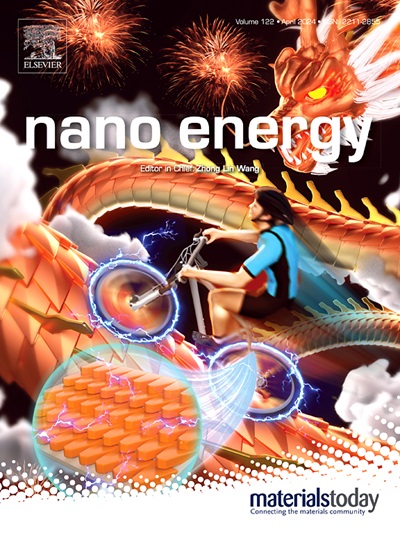Artificial intelligence-enabled smart monitoring of vancomycin concentration using a droplet-driven triboelectric nanogenerator
IF 16.8
1区 材料科学
Q1 CHEMISTRY, PHYSICAL
引用次数: 0
Abstract
Vancomycin is indispensable in modern medicine for treating serious Gram-positive infections, especially those that are resistant to other antibiotics. Meanwhile, monitoring of vancomycin concentration is necessary for assessing patients’ condition. It is urgent to develop a biosensor with rapid response and reliability. In this study, we introduce a droplet-driven triboelectric nanogenerator (DD-TENG) as a self-powered sensor for detecting vancomycin concentration. Texture and fluorination strategies were adopted to optimize the performance of DD-TENG. The triboelectric signals decreased with the increase of vancomycin concentration in droplets and reversed when the concentration exceeded a certain concentration, due to the change of triboelectrification between droplets and triboelectric material. Moreover, a deep learning model was applied to recognize different vancomycin concentrations and achieve high accuracies. In the application, DD-TENG was integrated into medical droppers to monitor vancomycin concentration. Furthermore, DD-TENG also shows great potential in detection of vancomycin concentration in human serum. This research introduces a compelling approach for intelligent detection within medical systems.

利用液滴驱动的三电纳米发电机,通过人工智能智能监测万古霉素浓度
万古霉素在现代医学中对于治疗严重的革兰氏阳性感染,特别是对其他抗生素具有耐药性的感染是必不可少的。同时,监测万古霉素浓度是评估患者病情的必要手段。开发一种快速、可靠的生物传感器是当务之急。在这项研究中,我们介绍了一种液滴驱动的摩擦电纳米发电机(DD-TENG)作为万古霉素浓度检测的自供电传感器。采用结构和氟化策略对DD-TENG的性能进行了优化。由于液滴和摩擦电材料之间的摩擦电作用发生了变化,摩擦电信号随着液滴中万古霉素浓度的增加而减小,当浓度超过一定浓度时,摩擦电信号发生逆转。此外,应用深度学习模型识别不同的万古霉素浓度,获得了较高的准确性。在应用中,将DD-TENG集成到医用滴管中监测万古霉素的浓度。此外,DD-TENG在检测人血清万古霉素浓度方面也显示出很大的潜力。本研究为医疗系统内的智能检测引入了一种引人注目的方法。
本文章由计算机程序翻译,如有差异,请以英文原文为准。
求助全文
约1分钟内获得全文
求助全文
来源期刊

Nano Energy
CHEMISTRY, PHYSICAL-NANOSCIENCE & NANOTECHNOLOGY
CiteScore
30.30
自引率
7.40%
发文量
1207
审稿时长
23 days
期刊介绍:
Nano Energy is a multidisciplinary, rapid-publication forum of original peer-reviewed contributions on the science and engineering of nanomaterials and nanodevices used in all forms of energy harvesting, conversion, storage, utilization and policy. Through its mixture of articles, reviews, communications, research news, and information on key developments, Nano Energy provides a comprehensive coverage of this exciting and dynamic field which joins nanoscience and nanotechnology with energy science. The journal is relevant to all those who are interested in nanomaterials solutions to the energy problem.
Nano Energy publishes original experimental and theoretical research on all aspects of energy-related research which utilizes nanomaterials and nanotechnology. Manuscripts of four types are considered: review articles which inform readers of the latest research and advances in energy science; rapid communications which feature exciting research breakthroughs in the field; full-length articles which report comprehensive research developments; and news and opinions which comment on topical issues or express views on the developments in related fields.
 求助内容:
求助内容: 应助结果提醒方式:
应助结果提醒方式:


